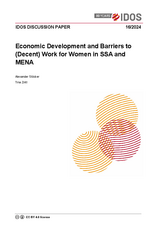Discussion Paper
Economic development and barriers to (decent) work for women in SSA and MENA
Stöcker, Alexander / Tina ZintlDiscussion Paper (16/2024)
Bonn: German Institute of Development and Sustainability (IDOS)
ISBN: 978-3-96021-241-6
DOI: https://doi.org/10.23661/idp16.2024
Price: 6 €
Gender inequality not only leads to poor labour market outcomes for women, both in terms of participation and the type of employment, but is also a constraining factor for economic development worldwide. While there is a sizeable pool of literature on the underlying barriers to female employment, it remains unclear how these barriers play out across different world regions. This paper discusses and compares the barriers to (decent) work faced by women in the Middle East and North Africa (MENA) and Sub-Saharan Africa (SSA). It is inspired by the three labour market transitions as countries develop economically over time (paid work, wage work and occupational variety) as presented by Bandiera et al. (2022a). Against this background, we identify the factors that are most helpful in explaining why so many women (i) do not take up any paid work; (ii) cannot find more decent (wage) work; and (iii) are rarely employed in specialized, well-remunerated and highly productive work.
We find that labour market outcomes of women in both regions are negatively affected by gender norms, yet in a remarkably different way. Women in the MENA region especially do not often take up paid work at all (first transition) due to strong prevailing social norms and prioritised personal commitments, such as care work and other household chores. Women in SSA are more often detained from finding wage work with better working conditions (second transition). For economic reasons, many African women need to contribute to the household income so gendered labour market barriers, such as care responsibilities and time constraints, frequently push them to accept precarious jobs. Possibilities to get into more specialised occupations (third transition) are slim for women in both our regions of interest, as they tend to continue working in traditionally female-dominated sectors. Yet, in MENA, occupational segregation often arises due to gender norms around appropriate workplace and tasks or transportation, while this link is less pronounced in SSA. Our approach, thus, allows us to compare the barriers to labour market inclusion and advancement that deny women better jobs and a more active role in economic development in different world regions.
Contact
Cornelia Hornschild
Publication Coordinator
E-mail Cornelia.Hornschild@idos-research.de
Phone +49 (0)228 94927-135
Fax +49 (0)228 94927-130
Alexandra Fante
Librarian/ Open Access Coordinator
E-Mail Alexandra.Fante@idos-research.de
Telefon +49 (0)228 94927-321
Fax +49 (0)228 94927-130





![[Translate to English:] Photo: Alexandra Fante, Bibliothekarin/Open Access-Koordinatorin](/fileadmin/_processed_/f/0/csm__c_Deutsches-Institut-fuer-Entwicklungspolitik_Fante_94ce4fa1ba.jpg)